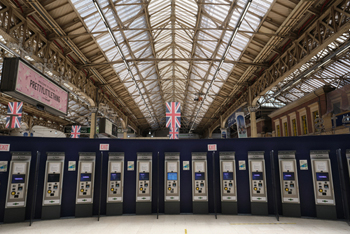A cross-party committee of peers has called on ministers to set out a clear strategy for rail fare reform before Great British Railways (GBR) goes into full operation.
Recommended reforms include ensuring that contactless payment technology is available across the network and improving ‘underwhelming’ flexible season tickets.
The House of Lords Built Environment Committee said the Government should ensure that GBR is clear about its objectives and can successfully implement the new system, which it said ‘will help secure early wins, build public trust and encourage passengers to use rail services’.

Unused ticket machines at London Victoria, July 2021
Following an inquiry into the fare reforms proposed in the Williams-Shapps Plan for Rail, the committee has put its main conclusions and recommendations in writing to rail minister Chris Heaton-Harris.
It said that single-leg pricing and contactless fare structures may generate more demand among commuters, but for long-distance travellers, dynamic pricing may help to spread demand.
Committee chair Baroness Neville-Rolfe said: ‘The launch of Great British Railways in 2023 provides a unique opportunity to clarify fares and reduce confusion.
‘On ticket types, one size doesn’t fit all. Two different approaches are needed: one for long-distance travel and another for regular short-distance commutes, often in urban areas. Journeys should be supported with technology, such as contactless or QR codes, to reflect customer expectations in the modern world.
‘Early wins for GBR could include reform of ticket types, digitalisation and improving the underwhelming new flexible season tickets currently on offer.’
The committee said the Government needs to ensure that contactless payment technology is available at all stations across the national rail network before the launch of GBR and should make the necessary infrastructure upgrades across the network.
It called for anomalies in the ticketing system to be addressed, such as the potential to save money through split ticketing, which can undermine passenger trust, and different off-peak windows, which cause confusion.
Register now for full access
Register just once to get unrestricted, real-time coverage of the issues and challenges facing UK transport and highways engineers.
Full website content includes the latest news, exclusive commentary from leading industry figures and detailed topical analysis of the highways, transportation, environment and place-shaping sectors.
Use the link below to register your details for full, free access.
Already a registered? Login